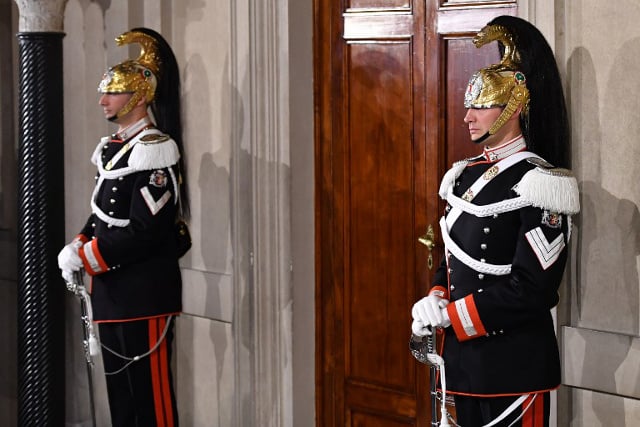Renzi formally resigned on Wednesday after losing a crucial referendum on constitutional changes on Sunday, bringing an end to the two years, 289 days reign of Italy's youngest premier.
IN PICTURES: The defining moments of Renzi's time as PM
Mattarella will try to form a cross-party coalition caretaker government to avoid being forced to call early elections – those are currently scheduled for February 2018.
The president met Senate president Pietro Grasso, Chamber of Deputies president Laura Boldrini and former head of state Giorgio Napolitano in the first of 48 hours of consultations that began at 6pm (1700 GMT).
Mattarella will continue his task on Friday with the smallest parties in parliament, with 41-year-old Renzi's Democratic Party (PD) last to be questioned.
The president will then likely announce a decision on Monday. Although Renzi had hinted in his resignation speech on Wednesday that he intends to lead his party into an early election battle, he spent Thursday celebrating his grandmother's 86th birthday and competing with his children on PlayStation, as Mattarella was forced to work through the Feast of the Immaculate Conception public holiday.
“And hopefully … I will have more luck in the PlayStation battle with my sons than I have had here,” Renzi had quipped in a resignation speech peppered with jokes – though La Stampa reported that he had lost that game too.
Knives being sharpened
It is far from the end of his political career, though, as Renzi retains the leadership of his party, the biggest force on Italy's centre-left.
He indicated that he intends to pursue his political career and a reformist agenda that won plaudits from the likes of US President Barack Obama and German Chancellor Angel Merkel.
Renzi received a boost on Thursday with a poll published by La Stampa daily, conducted a day after the referendum, giving the PD the backing of 32.5 percent of voters, ahead of the populist Five Star movement with 27 percent.
In addition, 57 percent of centre-left voters saw Renzi as the best leader available to the PD.
But there were also signs of knives being sharpened within the party after the referendum which Renzi's critics see as having eroded the party's base among the working class and young voters hardest hit by Italy's economic problems.
Luigi Zanda, head of the PD group in the Senate, acknowledged that “there are tensions within the party” but said he expected the need for unity to prevail.
Renzi admitted to the party's executive that he anticipated a “tough debate” over the lessons of the referendum and said he was open to proposals aimed at creating a broader coalition of the Italian left.
READ MORE: Six questions (and answers) after the Italian referendum
'Inevitably catastrophic'
But that idea was shot down by veteran leftist Nichi Vendola.
The former governor of the southern region of Puglia said Renzi had burnt his bridges with progressive forces.
“If reformism means having a left elite do the work of the right, the result is inevitably catastrophic,” Vendola told La Repubblica.
Before handing back the keys to his Palazzo Chigi residence, Renzi insisted the PD was ready for an early election battle with Five Star, the far-right Northern League and Silvio Berlusconi's fading Forza Italia.
“We are not afraid of anything or anybody,” Renzi said. Five Star and the Northern League are both demanding an early election but analysts have said that is unlikely.
Italy's entry into a period of political uncertainty has not created the kind of market turmoil some had predicted and a feared crisis in the banking sector has not materialized as a rescue plan for the most troubled lenders has begun to take shape.
Moody's ratings agency has however downgraded its outlook for the country's sovereign debt to negative from stable, saying the failure of the constitutional referendum slowed reform progress and left Italy more exposed to “unforeseen shocks”.
By Angus MacKinnonG



 Please whitelist us to continue reading.
Please whitelist us to continue reading.
Member comments